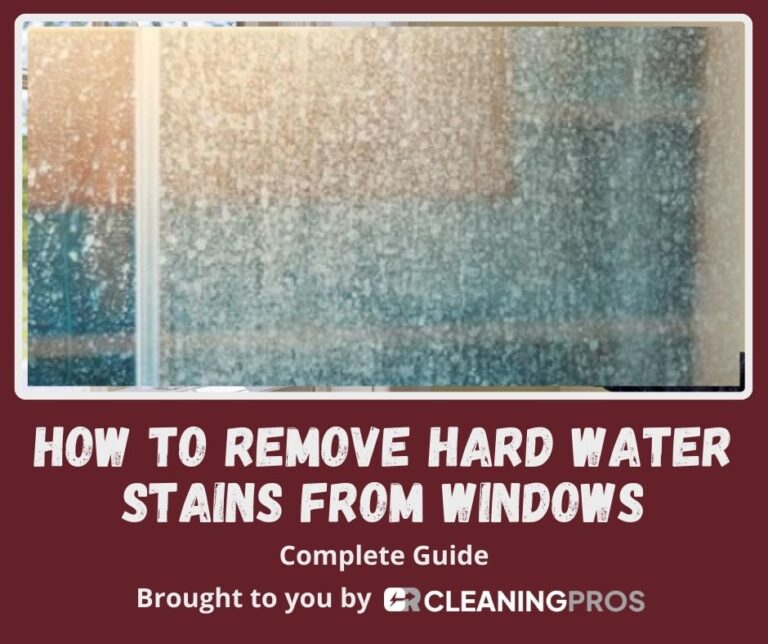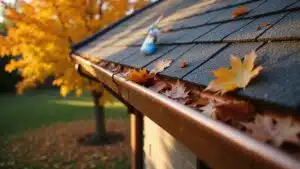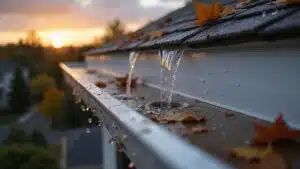Hard water stains on windows can be a common problem, especially in areas with high mineral content in the water. These stains, which often appear as cloudy, white spots or streaks, are caused by mineral deposits like calcium and magnesium. Over time, these stains can become more stubborn and difficult to remove if not addressed promptly. In this easy-to-follow guide, we’ll explore effective methods to clean hard water stains from your windows, using both natural remedies and commercial products. We’ll also discuss preventive measures to keep your windows sparkling clean and free from future stains.
What Causes Hard Water Stains on Windows?
Hard water contains high levels of dissolved minerals, particularly calcium and magnesium. When water splashes onto your windows and evaporates, it leaves behind these mineral deposits, which create the stains you see. These stains can accumulate over time, making the glass look dull and dirty.
Why It’s Important to Remove Hard Water Stains Quickly
Cleaning hard water stains as soon as they appear is crucial because the longer they sit on the glass, the harder they are to remove. If left untreated, these mineral deposits can etch the glass, leading to permanent damage that may require professional repair or replacement.
Tools and Materials You Will Need
Before you start cleaning, gather the following items:
-
White Vinegar
-
Baking Soda
-
Lemon Juice
-
Commercial Hard Water Stain Remover
-
Spray Bottle
-
Non-Abrasive Sponge or Cloth
-
Microfiber Cloths
-
Razor Blade (for tough stains)
These materials are readily available and effective in removing hard water stains from windows.
5 Steps to Clean Hard Water Stains
1. Using Vinegar: A Natural and Effective Solution
White vinegar is one of the best natural cleaners for removing hard water stains due to its acidic nature, which helps dissolve the mineral deposits.
Instructions
-
Mix equal parts of white vinegar and water in a spray bottle.
-
Spray the solution generously onto the stained areas of the window.
-
Let it sit for 5-10 minutes to allow the vinegar to break down the minerals.
-
Wipe the area with a non-abrasive sponge or cloth, scrubbing gently.
-
Rinse the glass with clean water and dry it with a microfiber cloth to avoid streaks.
Vinegar is not only effective but also safe for most types of glass, making it a great first option.
2. Baking Soda Paste: For Gentle Scrubbing
Baking soda is a mild abrasive that can help scrub away mineral deposits without scratching the glass.
Instructions
-
Mix baking soda with a small amount of water to create a thick paste.
-
Apply the paste to the stained areas of the window.
-
Use a soft cloth or sponge to gently rub the paste in circular motions.
-
Rinse thoroughly with water and dry the glass with a microfiber cloth.
This method is especially useful for tougher stains that don’t come off with vinegar alone.
3. Lemon Juice: Fresh and Effective
Lemon juice contains natural acids that can help dissolve mineral deposits and leave your windows looking clear and smelling fresh.
Instructions
-
Squeeze fresh lemon juice into a small bowl.
-
Dip a soft cloth or sponge into the juice and apply it to the stained areas.
-
Let it sit for a few minutes, then scrub gently.
-
Rinse with clean water and dry with a microfiber cloth.
Lemon juice is particularly effective on lighter stains and provides a natural cleaning alternative.
4. Commercial Hard Water Stain Removers
For more stubborn stains, commercial hard water stain removers are formulated to tackle tough mineral deposits.
Instructions
-
Follow the manufacturer’s instructions for the specific product.
-
Apply the cleaner to the stained area, using a cloth or sponge.
-
Allow it to sit for the recommended amount of time to break down the stains.
-
Rinse the window thoroughly and dry with a microfiber cloth to prevent streaks.
These products are designed for heavy-duty cleaning and can be very effective for severe stains.
5. Razor Blade: For Tough, Stubborn Stains
For extremely stubborn stains that don’t respond to other methods, a razor blade can be used with caution to scrape off mineral deposits.
Instructions
-
Wet the glass with water or a cleaning solution.
-
Hold the razor blade at a 45-degree angle to the glass and gently scrape the stains off.
-
Wipe the area with a microfiber cloth to remove any debris.
This method should be used carefully to avoid scratching the glass and is typically recommended for use on tempered glass.
Preventive Measures to Keep Your Windows Stain-Free
Once you’ve successfully cleaned your windows, it’s important to take steps to prevent hard water stains from returning. Here are some effective preventive measures:
-
Regular Window CleaningRegular cleaning is key to preventing the buildup of mineral deposits. Use a squeegee or microfiber cloth to dry the windows after washing to avoid water spots.
-
Apply a Water RepellentApplying a water repellent treatment to your windows can create a protective barrier that helps prevent water from clinging to the glass. This reduces the chance of mineral deposits forming.
-
Use a Water SoftenerIf you live in an area with hard water, consider installing a water softener. This device reduces the mineral content in your water, helping to prevent hard water stains on windows and other surfaces in your home.
-
Adjust SprinklersIf your sprinklers are spraying directly onto your windows, adjust them to avoid this. This simple step can significantly reduce the formation of hard water stains.
What to Do If the Glass Is Etched
In some cases, hard water stains can lead to etching, where the mineral deposits have corroded the glass surface. If this happens, the glass may appear dull and scratched.
1. Use a Glass Polishing Compound
Glass polishing compounds can sometimes restore the clarity of etched glass by smoothing out the damaged areas.
Instructions
-
Apply the polishing compound to a soft cloth
-
Buff the glass in a circular motion until the surface feels smooth and the clarity improves.
2. Consider Glass Replacement
If the etching is severe and cannot be removed, you may need to consider replacing the glass. Consult with a professional to assess the damage and determine the best course of action.
Conclusion
Cleaning hard water stains from windows doesn’t have to be a difficult task. By using the simple methods outlined in this guide—such as vinegar, baking soda, and lemon juice—you can effectively remove mineral deposits and restore your windows to their original clarity. Regular maintenance and preventive measures will help keep your windows looking great and free from stubborn stains. Remember, the key to clean, streak-free windows is consistency and prompt action.




